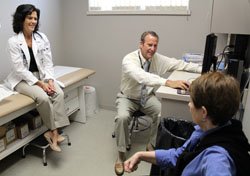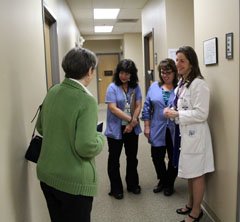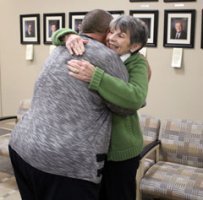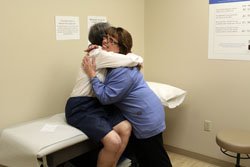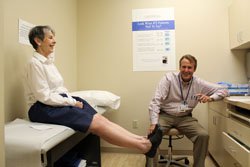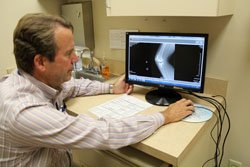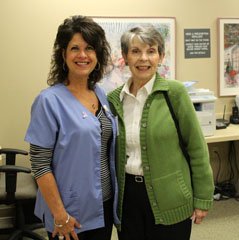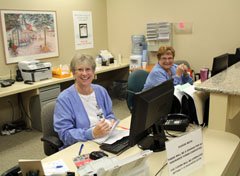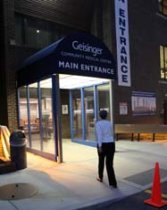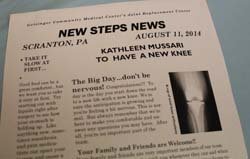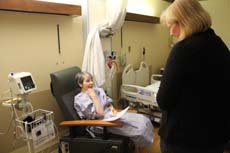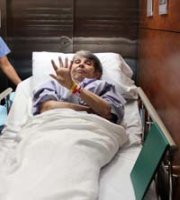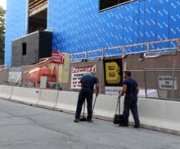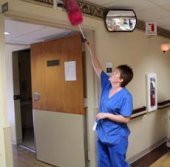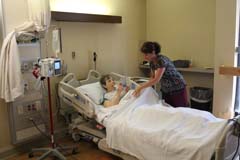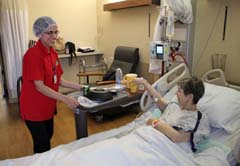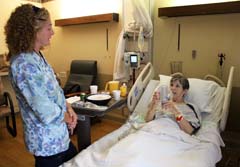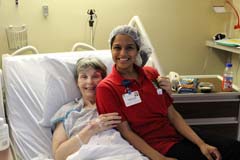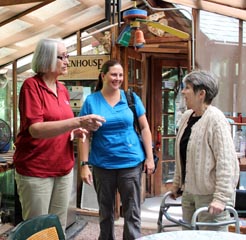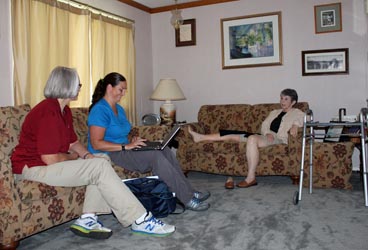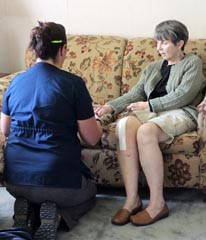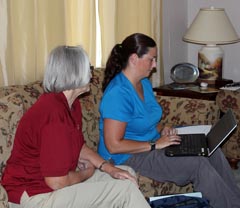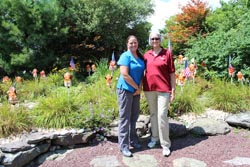America at Its Best: Memorable Moments from Kitch’s Total Knee Replacement Surgery, Part 3.
Written by Tony Mussari, Sr.
Edited by Kitch Loftus-Mussari
Digital photographs by Tony Mussari, Sr.
Copyright 2014
Mussari-Loftus Associates
The Face of America Project
Determine that a thing can and shall be done and then… find the way. Abraham Lincoln
Dtermination
Four words best describe Kitch’s third day in the hospital: courage, determination, kindness and persistence.
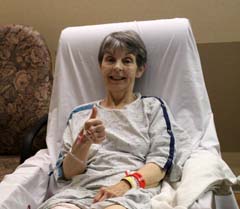
Kitch had a very difficult night. The nurses went out of their way to make her comfortable and enable her to get some rest.
At 8 a.m., a smiling Dr. Sal Lawrence visited with Kitch. The secret to their relationship is trust. Kitch knows from past experience that Dr. Lawrence will make every effort to help her. He did just that with kind words of encouragement.
Shortly after Dr. Lawrence left the room, Dr. Schmaltz entered. Dressed in his blue scrubs, he addressed one of the most important matters of the day, the removal of the bandages and the Jackson-Pratt Drain, a post-operative drain used for collecting fluids from the surgical site.
A physical therapist helped Kitch get into her street clothes.
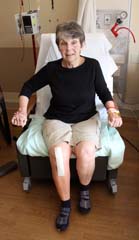
When I arrived at 9:30 a.m., Kitch was sitting in a recliner next to her bed. She was dressed in Bermuda shorts and a black shirt. For the first time, her swollen right knee and the bandage over the 6 inch incision were clearly visible.
We talked about a number of things including the decision to make this her last day in the hospital.
Quiet Heroes
At 9:39 a.m., a polite and personable member of the housekeeping staff knocked on the door. When she started to clean the room, we were impressed by her manner and style. Yes, she cleaned everything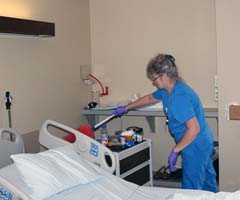 thoroughly, but she did something else that lifted our spirits. She talked with us with warmth and kindness.
thoroughly, but she did something else that lifted our spirits. She talked with us with warmth and kindness.
Dorie has a million dollar smile and a personality to match. She did more than clean the room. She brought comfort to its occupants. Talking with Dorie was the respite care we needed at this critical juncture in the day.
Robert E. Hudachek is a licensed social worker. There is only one way to describe his work. He is a link between the hospital and 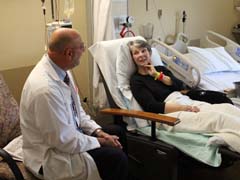 everyone who enters the front door. Little did he know when he entered Kitch’s room that this day would be a reunion day.
everyone who enters the front door. Little did he know when he entered Kitch’s room that this day would be a reunion day.
In 2007, Bob was the social worker at the hospital where I had my open heart surgery. He remembered both the television series Kitch and I produced about open heart surgery and the book we wrote about our experience.
This was a serendipitous moment for the three of us. For about 20 minutes we talked about our common experiences.
Bob has all the paper credentials for the important work he does. Equally important, he has all the human skills, sometimes called soft skills, needed to be an effective liaison between patients, family members, employees and the hospital.
Geisinger-CMC is to be applauded for maintaining a position like this and employing a person like Bob to do this important work.
Medical Care with a Personal Touch
Our next visitor provided invaluable information, and she set the direction and the tone for the day.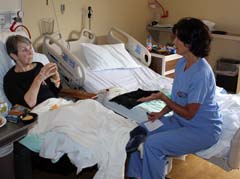
Mary Dunleavy has been working with Dr. Schmaltz for 17 years. She is a physician assistant. Everything about her is impressive. She is thorough. Her knowledge of the field is comprehensive. She appreciates the anxiety and fear of the patient and the caregiver. She has the gift of communication. She uses it to articulate inspiring messages of cooperation, encouragement and hope. She is willing to take the initiative to help eliminate pain and stress.
When you talk with Mary Dunleavy she is focused. She is a very good listener. She has mastered the art of listening with her eyes as well as her ears.
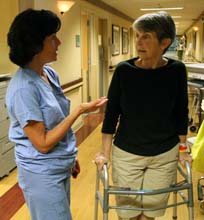
We were fortunate to have three conversations with Mary. At 10:46 a.m., she visited with us in Kitch’s room. She reviewed the medications Kitch was taking and she suggested some alternatives. To increase the hemoglobin (the number of red blood cells) she suggested that Kitch be given iron by intravenous.
She reinforced one of the most important goals of the day. It is better to leave the hospital and go home to familiar surroundings than prolong the stay in the hospital. The longer the stay in the hospital, she told us, the greater the possibility of infection.
That was a message both Kitch and I needed and wanted to hear. With Mary’s help, we designed a strategy to make it happen.
It would not be accomplished without a good deal of determination, courage and perseverance by Kitch. These are core values Kitch has practiced throughout her life.
In 1970, there were virtually no women in broadcast news in our part of the state. Kitch was one of the first females to crack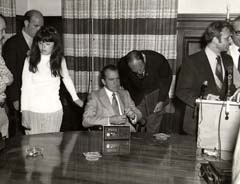 that barrier in radio. Throughout her career in both radio and TV, she was known for her determination to get the story and report it fairly without editorializing.
that barrier in radio. Throughout her career in both radio and TV, she was known for her determination to get the story and report it fairly without editorializing.
When she was diagnosed with breast cancer, she called upon these values to make it through chemotherapy and radiation treatment.
On this day, after a few setbacks caused by nausea and weakness, she managed to walk the hallway on the fifth floor twice, and she successfully demonstrated her ability to climb a few steps and get in and out of a car. Without meeting these requirements, she would not have been discharged from the hospital.
At 5:21 p.m., a nurse skillfully removed the needle used for intravenous therapy from the back of Kitch’s right hand, and we were ready to be discharged.
A Classic Act of Kindness
One of the most memorable acts of kindness Kitch experienced while she was in the hospital happened after Kitch was officially discharged from the hospital.
A young woman who worked at the nurse’s station in a non-medical 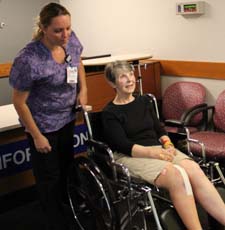 capacity volunteered to look for a wheelchair and transport Kitch to the entrance of the hospital. Ambulatory services was backed up with a number of other patients who had been discharged at about the same time.
capacity volunteered to look for a wheelchair and transport Kitch to the entrance of the hospital. Ambulatory services was backed up with a number of other patients who had been discharged at about the same time.
It is something Shannon Osborne had done many times before. It is not a part of her job description. Shannon is a pleasant person who likes to help patients when she can. In our opinion, what she did for Kitch and the spirit in which she did it gives truth to the prophetic words of Gabriella Cherup:
A hero is somebody who helps people
I had no hesitation about leaving Kitch at the entrance with Shannon while I went to the parking garage to get the car.
To my great surprise and delight, when I reentered the hospital to help Shannon, she and Kitch were engaged in a conversation with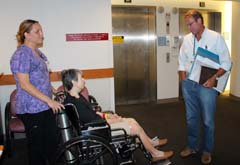 Dr. Harry Schmaltz. His hands filled with charts and papers, Dr. Schmaltz took the time to talk with Kitch.
Dr. Harry Schmaltz. His hands filled with charts and papers, Dr. Schmaltz took the time to talk with Kitch.
A Hollywood screenwriter could not conceptualize a better ending. It was all there in that scene. The surgeon may well do miraculous work in the operating room, but it takes a team effort to be successful there as well as in the patient’s room after the operation.
At 7:15 p.m, Kitch was home. It was a wonderful sight to see her  take her first steps into our garden.
take her first steps into our garden.
Before we ended the day we talked about all the experiences we had, and all the kind people who contributed to the success of the operation. We gave thanks for a day when courage, determination, kindness and persistence prevailed.
The poetic words of Edgar A. Guest best describe the genuine Faces of America at its best who we met during Kitch’s total knee replacement surgery.
Courage was never designed for show;
It isn’t a thing that can come and go;
It’s written in victory and defeat
And every trial a man may meet.
It’s part of his hours, his days and his years,
Back of his smiles and behind his tears.
Courage is more than a daring deed:
It’s the breath of life and a strong man’s creed.
Thank you, Dr. Sal Lawrence.
Thank you, Dorie.
Thank you, Robert E. Hudachek.
Thank you, Mary Dunleavy.
Thank you, Barb.
Thank You, Shannon Osborne.
Thank you, Dr. Harry Schmaltz and the team at Scranton Orthopaedic Specialists.
Please provide feedback to:
tony.mussari@gmail.com
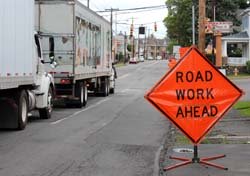 avoid the construction on the interstate highway, we took the blue-lined roads.
avoid the construction on the interstate highway, we took the blue-lined roads.
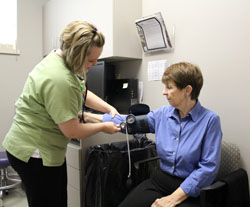 Orthopaedic Specialists are first class. Dr. Harry Schmaltz and his team give special meaning to the words of the Canadian scientist, William Osler. Their treatment is deeply rooted in competence, compassion, camaraderie, caring, community and continuity.
Orthopaedic Specialists are first class. Dr. Harry Schmaltz and his team give special meaning to the words of the Canadian scientist, William Osler. Their treatment is deeply rooted in competence, compassion, camaraderie, caring, community and continuity.
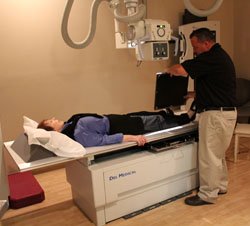
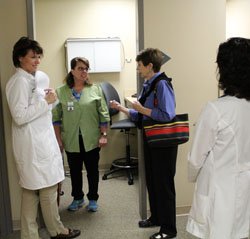 happiness.
happiness.
